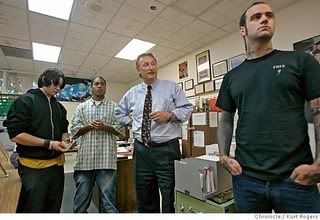
Casey Watson is probably the one person I know who can honestly say, "straight edge saved my life." Over the past 15 years he's played in innumerable bands, traveled widely, and I think grown into the person he truly wants to be. It was a pleasure to see him recognized outside of the scene he loves. (Text from the San Francisco Chronicle.)
At age 14, James Lee Williams was convicted of robbery, extortion and making terrorist threats, crimes committed when he was high on marijuana and alcohol. He had gone to Juvenile Hall seven times by age 17.
Ryun Repetto started drinking alcohol when he was 12 and soon graduated to marijuana, cocaine, mushrooms and LSD. He hit bottom at 16, when -- loaded and in a rage -- he tried to kill his father by stabbing him and beating him with a club.
Today, Williams and Repetto, both 18, are sober. They talk about attending college and how they are mending relationships with their families. Both finished the San Francisco Marathon in July.
Their lives began to change, they say, when a judge sent them to spend one year at Thunder Road, a one-of-a-kind drug rehabilitation program for teens. Located in Oakland and modeled after the Betty Ford Center, Thunder Road is the only chemical dependency recovery hospital for youth in California.
"I knew something had to change, but I didn't know what it was," Williams said. "Now, I feel like I have my priorities straight."
Repetto said, "I came in here, and I was going to fake it. But if you are willing to listen, and you go to AA meetings, if you really try, it works."
Thunder Road has been designated as the beneficiary of the Alta Bates Summit Foundation's annual celebrity classic tennis tournament, which takes place Saturday at the Berkeley Tennis Club.
The event -- headlined by two-time Grand Slam Finalist Todd Martin and by MaliVai Washington, the first African American man to reach a Grand Slam singles final since Arthur Ashe -- will also feature celebrities such as actor Dick Van Patten, Judge Joseph Wapner and game show host Wink Martindale.
The proceeds have been earmarked to expand Thunder Road's culinary arts program, which provides the kind of vocational training that helped one Thunder Road graduate become a pastry chef at San Francisco's Postrio restaurant.
Sixty percent of the teens at Thunder Road have been sentenced there by the courts for a year of inpatient care funded by taxpayers and private grants, while others have typically been committed by parents for shorter treatment stays.
Everyone there has to abide by strict rules -- no romantic relationships, no cursing, no tobacco use -- and to follow rigidly structured schedules. There are daily treatment assignments, Narcotics Anonymous meetings, school, group therapy and family-dynamics meetings, which parents are required to attend.
The hospital often has a long waiting list, something administrator Tom Gerstel said is a reflection of how few drug and alcohol treatment programs are available to youth.
Four out of 5 people in prison have serious drug and alcohol problems, Gerstel said. The Bay Area has roughly 1,400 kids locked up in juvenile halls but just 250 residential beds in group homes with drug and alcohol counseling. Thunder Road's 50 beds are the only ones licensed for both hospital and group home use.
"We shouldn't be incarcerating our way out of this problem," Gerstel said. "But adolescent treatment just hasn't been the focus."
To learn more about benefit, Thunder Road
For more information about Thunder Road, go to thunder-road.org or call (510) 653-5040. For information about the Alta Bates Summit Foundation's Celebrity Classic, go to absfdn.org or call (510) 204-1667.
No comments:
Post a Comment